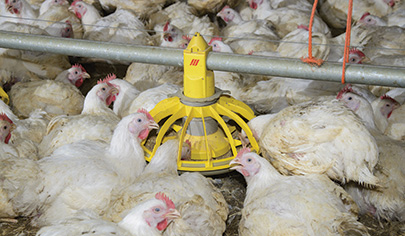Why vitamin D supplements are vital for good poultry health
 © FLPA/John Eveson/REX/Shutterstock
© FLPA/John Eveson/REX/Shutterstock An adequate supply of vitamins and minerals is necessary in poultry for boosting defences and allowing the bird to reach its full genetic potential, writes Ruth Fennell, poultry graduate trainee with Devenish, based in Ireland.
Vitamin D, for example, plays a vital role in the regulation of calcium and phosphorus metabolism, which are key to optimising the skeletal system by strengthening bones, beaks and claws.
The two primary concerns relating to skeletal disorders in poultry are: osteoporosis in egg-laying hens and leg problems caused by rapid bone growth and increased daily gains in broilers.
While calcium and phosphorus play a critical role, the importance of Vitamin D in this process must not be overlooked.
See also: How to meet the nutritional needs of broilers
The chemical pathway
Vitamin D, which is derived either from the diet or from sunlight via the skin, is biologically inactive and so requires “activation” through enzymes.
In practice, vitamin D3 is absorbed from the bird’s intestine and is transported to the liver and then the kidney, where it becomes an active hormonal compound called calcitriol.
Calcitriol is key to controlling calcium levels in the body.
This chemical process is regulated by two specific hormones – namely the parathyroid hormone and calcitonin, in response to blood calcium levels.
If blood calcium is low, parathyroid hormone is induced, which leads to an increase in calcium absorption in the intestine, mobilisation of calcium from the bones and a reduction in calcium excretion via the kidney.
If blood calcium is high, the thyroid gland secretes calcitonin, which results in a reduction in calcium absorption in the intestine, lower calcium release from the bones, and increased calcium excretion.
Similar chemical processes involving the activation of vitamin D control levels of phosphorous in the chicken.
Other bone functions
Vitamin D has other bone-related functions, in addition to mineral mobilisation from the bone to correct deficiencies.
In the intestine, it promotes the creation of calcium-binding proteins, and stimulates calcium, phosphorus and magnesium absorption.
During bone formation, minerals are deposited on the protein matrix. But this process is challenged during a vitamin D deficiency, which leads to the development of rickets in young birds, and osteomalacia in adult birds.
In layers, cage fatigue is another common problem in birds with high egg production rates, caused by inadequate calcium levels to meet egg production demand.
The bird preferentially removes calcium stored in her bones to meet the demand for eggs, giving rise to bones which become soft and fracture easily over time.
Supplementation with calcium and vitamin D3 can reduce and relieve such disorders.
Beyond the bone
The functions of vitamin D stretch beyond bone integrity, as it affects a range of other organs and tissues, including the pancreas, parathyroid glands, bone marrow, and certain cells of the ovary, brain and stomach.
Vitamin D is also required for embryonic development, where it stimulates yolk calcium mobilisation for the chick.
It also affects the production of the hormone calcitriol, which is essential for the transport of eggshell calcium to the embryo across the chorioallantoic membrane.
Calcitriol is also involved in the development of the immune systems of chicks, which can be suppressed by a vitamin D deficiency.
Feed supplementation
Synthesis of vitamin D in the skin of poultry through exposure to direct sunlight is limited, while feed raw materials contain just miniscule amounts of natural vitamin D3.
All poultry feedstuffs therefore need to be supplemented, and the form of vitamin D included is crucial.
The D3 form for poultry has a high bio-availability, while the bio-availibity of the D2 form is very limited. But it is the metabolites of vitamin D3 that are the most effective sources.
These vitamin D3 metabolites can be added “over the top” to diets already supplemented with the inactive form of vitamin D3.
Additional supplementation of such metabolites can improve leg disorders and enhance the utilisation of phytate-phosphorus and trace minerals. An improved broiler bodyweight can be demonstrated, along with a reduced incidence and severity of bone disorders.
